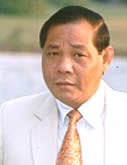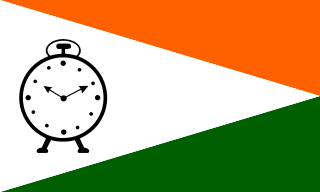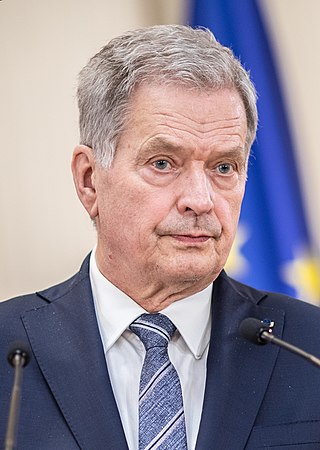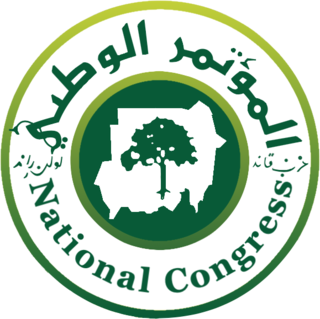The National Coalition Party is a liberal-conservative political party in Finland. It is currently the biggest party and the ruling political party of Finland.

Purno Agitok Sangma was an Indian politician who has served as the 4th Chief Minister of Meghalaya from 1988 to 1990 and the 11th Speaker of the Lok Sabha from 1996 to 1998. He served as a member of the Lok Sabha from Tura in Meghalaya from 2014 to 2016, 1991 to 2008 and from 1977 to 1989 and the minister of Information and Broadcasting in the Rao ministry from 1995 to 1996. He was the founder of National People's Party and co-founder of Nationalist Congress Party.

The Nationalist Congress Party is one of the state parties in India. It refers to the Ajit Pawar faction after the 2023 split in the party when the Supreme Court of India granted the original party name and symbol to the Nationalist Congress Party. It was one of the major political parties in Maharashtra and was a recognised state party in Nagaland and Kerala. In July 2023, majority of the elected MLAs and MLCs of the party led by Ajit Pawar joined the National Democratic Alliance government, however, all MPs except two remained loyal to Sharad Pawar. This caused a direct split between the Ajit Pawar-led faction and the founder and president Sharad Pawar who formed the Nationalist Congress Party after EC recognised the Ajit Pawar faction as the original party.

The United Democratic Party is a political party in the Gambia, founded in 1996 by 3 political parties and choose the human rights lawyer, freedom fighter, ANM Ousainou Darboe to be the party leader and Secretary General. As a candidate in the presidential election of 18 October 2001, he came second with 32.6% of the popular vote; he took second place again in the 22 September 2006 presidential election with 26.7% of the vote. The 17 January 2002 parliamentary election was boycotted by the party. In the 25 January 2007 parliamentary election, the party won four out of 48 seats.

Sauli Väinämö Niinistö is a Finnish politician who served as the 12th president of Finland from 2012 to 2024.

The National Congress Party was a major political party that dominated domestic politics in Sudan from its foundation until the Sudanese Revolution.
The New Country Party was a minor political party in Australia. It emerged from the internal divisions of the One Nation Party in Queensland and Western Australia in 2003 and was registered by the Australian Electoral Commission on 9 January 2004. Two Western Australian state upper house MPs elected on One Nation tickets, Paddy Embry and Frank Hough, joined the party and were its only serving MPs until their defeat in the Western Australian state election in 2005.
The National Convention Party (NCP) is a centre-left political party in Gambia. It was the main opposition party between 1975 and 1994. It was originally founded on 7 September 1975 when it first launched at Busumbala by former vice-president Sheriff Mustapha Dibba two weeks after his expulsion from the People's Progressive Party (PPP). It initially welcomed the 1994 coup but was banned from participating in elections in August 1994. Prior to the 1992 elections, the party faced a series of setbacks as many of its leaders rejoin the PPP. Its candidate at the presidential elections of 18 October 2001, Sheriff Dibba, came fourth with 3.77% of the popular vote. At the last legislative elections, held on 17 January 2002, the party won no seats. When the party was formed, the then president of the country Dawda Jawara predicted that it would not last more than three months. The NCP was part of the Coalition 2016 for the 2016 presidential election, where Adama Barrow was declared the opposition's candidate and subsequently won.

The People's Progressive Party is a political party in the Gambia. It was the dominant ruling party of the House of Representatives and the presidency from 1962 to 1994. The president throughout this time period was Dawda Jawara. The People's Progressive Party lost power after the 1994 Gambian coup d'état, a military coup led by young, junior military officers. The Alliance for Patriotic Reorientation and Construction (APRC) then became the dominant party of the Gambia. The People's Progressive Party remains active, but lacking the same level of support it garnered in the 20th century.
The National Convention Party (NCP) is a political party in Ghana that existed between 1992 and January 1996.

The National Assembly of the Gambia is the unicameral legislature of the Gambia. The authorisation for the National Assembly lies in Chapter VII of the Constitution of the Gambia. It is composed of 53 members directly elected through first past the post, and a further five members appointed by the President.
Sheriff Mustapha Dibba was a veteran Gambian politician who was the 1st Vice-President of the Gambia (1970–1972) and also served as the country's National Assembly speaker from 2002 to 2006. He was also leader of the National Convention Party (NCP).

The Centre Party was a Dutch nationalist, right-wing extremist political party espousing an anti-immigrant program. The party was founded by Henry Brookman in 1980, and was represented by Hans Janmaat in the Dutch House of Representatives from 1982, until he was expelled from the party in 1984 and joined the more moderate Centre Democrats. The CP, as well as the CD, was subject to a cordon sanitaire by the other parties in the House of Representatives. After much infighting and finally legal proceedings against the party, it was declared bankrupt in 1986. The party was soon after succeeded by the Centre Party '86, which would become increasingly radical, until it was banned in 1998.

General elections were held in Sudan between 11 and 15 April 2010, extended from the original end date of 13 April. The elections were held to elect the President and National Assembly of Sudan, as well as the President and Legislative Assembly of Southern Sudan. The election brought to the end the transitional period which began when the decades-long Second Sudanese Civil War ended in 2005.
The Nationalist Citizens' Party was a Philippine nationalist party established by Claro M. Recto and Lorenzo Tañada in 1957. Recto became its presidential candidate for the 1957 presidential election, where he was defeated, getting 9% of the vote. Tañada was eventually elected to the Senate under the party in 1959. The NCP functioned as a third party in a political climate dominated by the Nacionalista Party and the Liberal Party.
Sanjaykaka Ramchandra Patil is a politician from Tasgaon of Sangli district of Maharashtra state in India. He was member of Legislative Council of Maharashtra from Nationalist Congress Party (NCP). He is present Member of Parliament for Sangli Lok Sabha constituency. He was competing with NCP Leader R. R. Patil for Tasgaon - Kavathe-Mahankal Legislative Assembly. He loss the election of MLA in Tasgaon Kavathe Mahankal Assembly by few votes. In February 2014 he quit NCP and joined Bharatiya Janata Party. He contested Sangli seat in Indian general elections in 2014 as BJP / NDA candidate and won the election with the majority of 238,000 votes. He defeated the Indian National Congress leader Pratik Patil.

The 2019 Maharashtra Legislative Assembly election was held on 21 October 2019 to elect all 288 members of the state's Legislative Assembly. After a 61.4% turnout in the election, the ruling National Democratic Alliance (NDA) of the Bharatiya Janata Party (BJP) and Shiv Sena (SHS) won a majority. Following differences over the government formation, the alliance was dissolved, precipitating a political crisis.

The 2019 Indian general election in Maharashtra held in April 2019. These were held for 48 seats in 4 phases; 11 April, 18 April, 23 April and 29 April 2019.

The 2003 Meghalaya Legislative Assembly election was held on 26 February 2003. The north-east Indian state's seventh Legislative Assembly election saw major changes with 28 sitting members and two former Chief Ministers losing their seats. The election also produced the largest representation for the national parties and, to that point, the smallest representation for the regional parties. No party won a majority of seats and despite more than a five percent loss in the popular vote compared to the 1998 election, the INC secured a plurality. Initially, the NCP under leader E. D. Marak attempted to form a government, but failed to secure support for a majority. Subsequently, D. D. Lapang was invited by Governor M. M. Jacob to present a majority, which was successfully achieved through the formation of the Meghalaya Democratic Alliance (MDA) coalition. Made up of 42 members of the Legislative Assembly (MLAs), the MDA consisted of the INC, the United Democratic Party (UDP), the Meghalaya Democratic Party (MDP), the Khun Hynniewtrep National Awakening Movement (KHNAM) and three independents. D.D. Lapang was confirmed as Chief Minister with Donkupar Roy of the UPD as Deputy Chief Minister.

In January 2003, Sushilkumar Shinde was sworn in as Chief Minister of Maharashtra, on resignation of his predecessor Vilasrao Deshmukh. Shinde led a cabinet consisting of his Congress party and alliance partner NCP, till the 2004 Maharashtra Legislative Assembly election. The Congress-NCP alliance secured a majority in those elections, but the Shinde ministry was replaced by his Deshmukh's second ministry.














